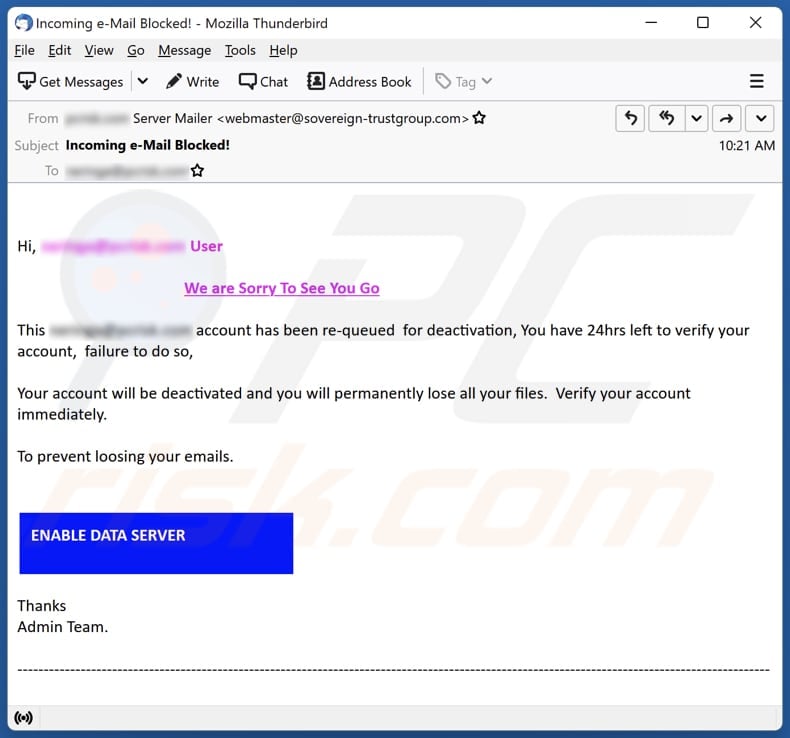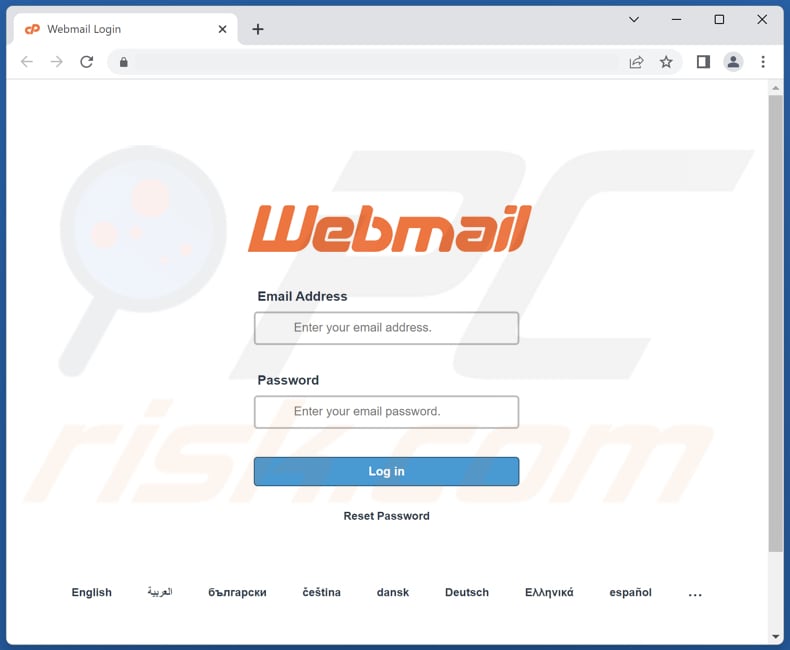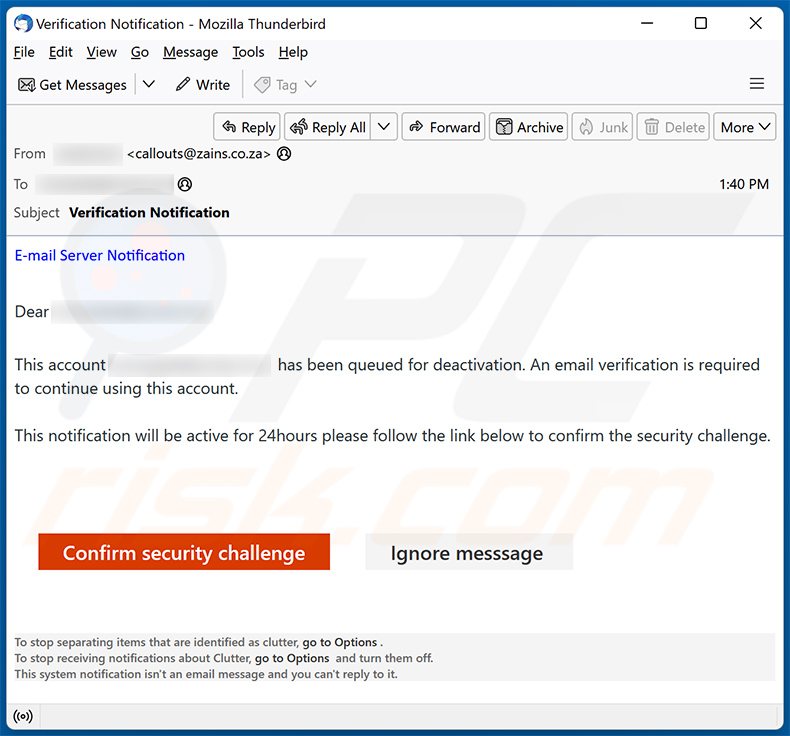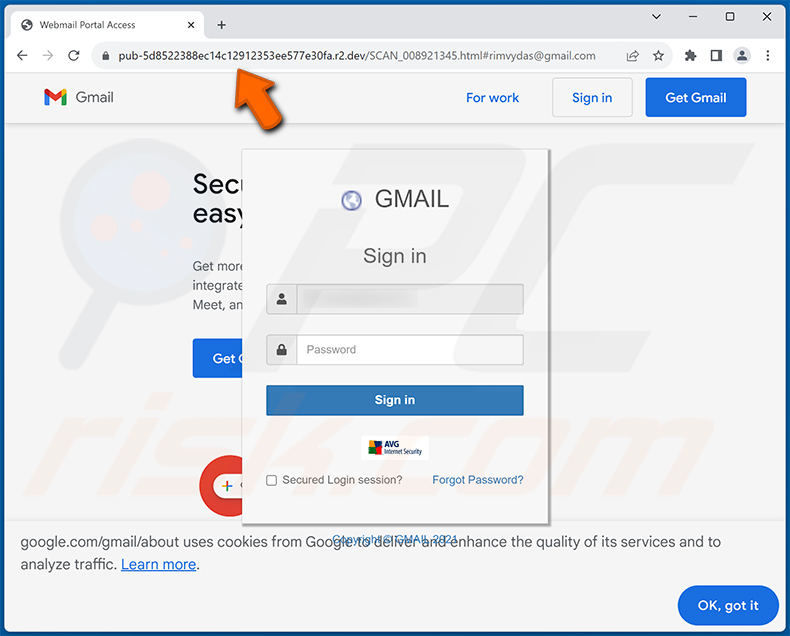How to spot scams like "Account Has Been Re-queued For Deactivation"
Phishing/ScamAlso Known As: Account Has Been Re-queued For Deactivation phishing email
Get free scan and check if your device is infected.
Remove it nowTo use full-featured product, you have to purchase a license for Combo Cleaner. Seven days free trial available. Combo Cleaner is owned and operated by RCS LT, the parent company of PCRisk.com.
What kind of scam is "Account Has Been Re-queued For Deactivation"?
Our investigation has determined that this email has been fabricated by scammers posing as an email service provider with malicious intent. The primary objective of these scammers is to deceive recipients into divulging sensitive information through a fake login page, commonly known as a phishing site.

More about the "Account Has Been Re-queued For Deactivation" scam email
This phishing email states that the recipient's account has been flagged for deactivation and that the recipient has 24 hours to verify the account. It warns that failing to do so will result in permanent loss of all files. In order to prevent this, the email advises the recipient to enable the data server by clicking on a provided link.
The email claims to be from the Admin Team and emphasizes the urgency of taking immediate action to avoid any inconvenience. The link in this email (labeled "ENABLE DATA SERVER") opens a fake login page designed to steal email account login credentials.
Providing email account login credentials to scammers on a phishing page can have severe consequences. The scammers can gain unauthorized access to the victim's email account, allowing them to exploit sensitive information and carry out various malicious activities.
Scammers can access the victim's email account and view personal and sensitive information stored within the account, including emails, contacts, and attachments. Also, scammers can impersonate the victim and send fraudulent emails to contacts, potentially leading to identity theft or financial scams.
Furthermore, once scammers gain access to the email account, they may change account settings, including passwords and recovery options, effectively locking the victim out of the account. Scammers can also utilize the compromised email account to send spam emails or launch phishing campaigns to further target the victim's contacts, spreading malware or attempting to obtain more personal information.
| Name | Account Has Been Re-queued For Deactivation Email Scam |
| Threat Type | Phishing, Scam, Social Engineering, Fraud |
| Fake Claim | Email account has been re-queued for deactivation |
| Related Domain | albodeinvestments[.]com |
| Detection Names (albodeinvestments[.]com) | Avira (Phishing), CRDF (Malicious), Emsisoft (Phishing), Kaspersky (Phishing), Netcraft (Malicious), Full List Of Detections (VirusTotal) |
| Disguise | Letter from an email service provider |
| Symptoms | Unauthorized online purchases, changed online account passwords, identity theft, illegal access of the computer. |
| Distribution methods | Deceptive emails, rogue online pop-up ads, search engine poisoning techniques, misspelled domains. |
| Damage | Loss of sensitive private information, monetary loss, identity theft. |
| Malware Removal (Windows) |
To eliminate possible malware infections, scan your computer with legitimate antivirus software. Our security researchers recommend using Combo Cleaner. Download Combo CleanerTo use full-featured product, you have to purchase a license for Combo Cleaner. 7 days free trial available. Combo Cleaner is owned and operated by RCS LT, the parent company of PCRisk.com. |
Similar scam emails in general
Phishing emails typically share common characteristics aimed at deceiving recipients. These include spoofed sender information, urgent or fear-inducing language, and requests for personal information. Also, emails can also be used to trick recipients into downloading and running malware.
Examples of phishing emails are "New Webmail Version Email Scam", "You've Received A Secure File Email Scam", and "Interested In Buying Your Property Email Scam".
How do spam campaigns infect computers?
Threat actors employ email to distribute malware by embedding harmful files or links in their messages. These files come in various formats, such as archives (e.g., ZIP and RAR), executables (e.g., .exe and .run), documents (e.g., PDF and Microsoft Office), JavaScript files, ISO files, and more.
The infection process initiates when a user executes, runs, or opens one of these files. For example, Microsoft Office documents can infect devices by executing malicious macro commands, while other files may necessitate additional actions to deploy the malware.
How to avoid installation of malware?
Exercise caution when opening email attachments or clicking on links from unknown or suspicious email addresses, especially when emails are unexpected. Keep your operating system, software, and plugins updated with the latest security patches. Regularly update your antivirus software to ensure optimal protection.
When downloading programs, rely on trusted sources and avoid downloading from Peer-to-Peer networks, dubious websites, or third-party downloaders. Be cautious when encountering advertisements, pop-ups, or links on untrustworthy websites.
If you've already opened malicious attachments, we recommend running a scan with Combo Cleaner Antivirus for Windows to automatically eliminate infiltrated malware.
Text presented in the "Account Has Been Re-queued For Deactivation" email letter:
Subject:
Hi, ******** User
We are Sorry To See You Go
This ******** account has been re-queued for deactivation, You have 24hrs left to verify your account, failure to do so,
Your account will be deactivated and you will permanently lose all your files. Verify your account immediately.
To prevent loosing your emails.
ENABLE DATA SERVER
Thanks
Admin Team.
Screenshot of the phishing website:

Another example of an email from this spam campaign:

Text presented within:
Subject: Verification Notification
E-mail Server NotificationDear *******
This account ******* has been queued for deactivation. An email verification is required to continue using this account.
This notification will be active for 24hours please follow the link below to confirm the security challenge.Confirm security challenge Ignore messsage
To stop separating items that are identified as clutter, go to Options .
To stop receiving notifications about Clutter, go to Options and turn them off.
This system notification isn't an email message and you can't reply to it.
Screenshot of the promoted phishing site designed to imitate user's email service provider's website:

Instant automatic malware removal:
Manual threat removal might be a lengthy and complicated process that requires advanced IT skills. Combo Cleaner is a professional automatic malware removal tool that is recommended to get rid of malware. Download it by clicking the button below:
DOWNLOAD Combo CleanerBy downloading any software listed on this website you agree to our Privacy Policy and Terms of Use. To use full-featured product, you have to purchase a license for Combo Cleaner. 7 days free trial available. Combo Cleaner is owned and operated by RCS LT, the parent company of PCRisk.com.
Quick menu:
- What is Account Has Been Re-queued For Deactivation phishing email?
- Types of malicious emails.
- How to spot a malicious email?
- What to do if you fell for an email scam?
Types of malicious emails:
![]() Phishing Emails
Phishing Emails
Most commonly, cybercriminals use deceptive emails to trick Internet users into giving away their sensitive private information, for example, login information for various online services, email accounts, or online banking information.
Such attacks are called phishing. In a phishing attack, cybercriminals usually send an email message with some popular service logo (for example, Microsoft, DHL, Amazon, Netflix), create urgency (wrong shipping address, expired password, etc.), and place a link which they hope their potential victims will click on.
After clicking the link presented in such email message, victims are redirected to a fake website that looks identical or extremely similar to the original one. Victims are then asked to enter their password, credit card details, or some other information that gets stolen by cybercriminals.
![]() Emails with Malicious Attachments
Emails with Malicious Attachments
Another popular attack vector is email spam with malicious attachments that infect users' computers with malware. Malicious attachments usually carry trojans that are capable of stealing passwords, banking information, and other sensitive information.
In such attacks, cybercriminals' main goal is to trick their potential victims into opening an infected email attachment. To achieve this goal, email messages usually talk about recently received invoices, faxes, or voice messages.
If a potential victim falls for the lure and opens the attachment, their computers get infected, and cybercriminals can collect a lot of sensitive information.
While it's a more complicated method to steal personal information (spam filters and antivirus programs usually detect such attempts), if successful, cybercriminals can get a much wider array of data and can collect information for a long period of time.
![]() Sextortion Emails
Sextortion Emails
This is a type of phishing. In this case, users receive an email claiming that a cybercriminal could access the webcam of the potential victim and has a video recording of one's masturbation.
To get rid of the video, victims are asked to pay a ransom (usually using Bitcoin or another cryptocurrency). Nevertheless, all of these claims are false - users who receive such emails should ignore and delete them.
How to spot a malicious email?
While cyber criminals try to make their lure emails look trustworthy, here are some things that you should look for when trying to spot a phishing email:
- Check the sender's ("from") email address: Hover your mouse over the "from" address and check if it's legitimate. For example, if you received an email from Microsoft, be sure to check if the email address is @microsoft.com and not something suspicious like @m1crosoft.com, @microsfot.com, @account-security-noreply.com, etc.
- Check for generic greetings: If the greeting in the email is "Dear user", "Dear @youremail.com", "Dear valued customer", this should raise suspiciousness. Most commonly, companies call you by your name. Lack of this information could signal a phishing attempt.
- Check the links in the email: Hover your mouse over the link presented in the email, if the link that appears seems suspicious, don't click it. For example, if you received an email from Microsoft and the link in the email shows that it will go to firebasestorage.googleapis.com/v0... you shouldn't trust it. It's best not to click any links in the emails but to visit the company website that sent you the email in the first place.
- Don't blindly trust email attachments: Most commonly, legitimate companies will ask you to log in to their website and to view any documents there; if you received an email with an attachment, it's a good idea to scan it with an antivirus application. Infected email attachments are a common attack vector used by cybercriminals.
To minimise the risk of opening phishing and malicious emails we recommend using Combo Cleaner Antivirus for Windows.
Example of a spam email:

What to do if you fell for an email scam?
- If you clicked on a link in a phishing email and entered your password - be sure to change your password as soon as possible. Usually, cybercriminals collect stolen credentials and then sell them to other groups that use them for malicious purposes. If you change your password in a timely manner, there's a chance that criminals won't have enough time to do any damage.
- If you entered your credit card information - contact your bank as soon as possible and explain the situation. There's a good chance that you will need to cancel your compromised credit card and get a new one.
- If you see any signs of identity theft - you should immediately contact the Federal Trade Commission. This institution will collect information about your situation and create a personal recovery plan.
- If you opened a malicious attachment - your computer is probably infected, you should scan it with a reputable antivirus application. For this purpose, we recommend using Combo Cleaner Antivirus for Windows.
- Help other Internet users - report phishing emails to Anti-Phishing Working Group, FBI’s Internet Crime Complaint Center, National Fraud Information Center and U.S. Department of Justice.
Frequently Asked Questions (FAQ)
Why did I receive this email?
Scammers send identical messages to a large number of recipients, aiming to deceive at least one person. These spam emails lack personalization and are sent in bulk.
I have provided my personal information when tricked by this email, what should I do?
If you have shared any account credentials (e.g., email address and password), it is crucial to change all passwords without delay. In the event that you have disclosed additional personal information, such as credit card details or ID card information, it is advised to promptly notify the relevant authorities for further assistance.
I have downloaded and opened a malicious file attached to an email, is my computer infected?
Executing executable files poses a significant risk of malware infection, as it often results in the infiltration of malicious software. However, opening a document or any other file might not be sufficient for malware to compromise the system.
I have read the email but didn't open the attachment, is my computer infected?
No, merely opening an email poses no harm. It is the act of clicking links within the email or opening attached files that can potentially lead to system infections.
Will Combo Cleaner remove malware infections that were present in email attachment?
Combo Cleaner possesses the capability to detect and eliminate nearly all recognized malware infections. However, it is essential to note that sophisticated malware often conceals itself deeply within the system, making it imperative to perform a full system scan for thorough detection and removal.
Share:

Tomas Meskauskas
Expert security researcher, professional malware analyst
I am passionate about computer security and technology. I have an experience of over 10 years working in various companies related to computer technical issue solving and Internet security. I have been working as an author and editor for pcrisk.com since 2010. Follow me on Twitter and LinkedIn to stay informed about the latest online security threats.
PCrisk security portal is brought by a company RCS LT.
Joined forces of security researchers help educate computer users about the latest online security threats. More information about the company RCS LT.
Our malware removal guides are free. However, if you want to support us you can send us a donation.
DonatePCrisk security portal is brought by a company RCS LT.
Joined forces of security researchers help educate computer users about the latest online security threats. More information about the company RCS LT.
Our malware removal guides are free. However, if you want to support us you can send us a donation.
Donate
▼ Show Discussion